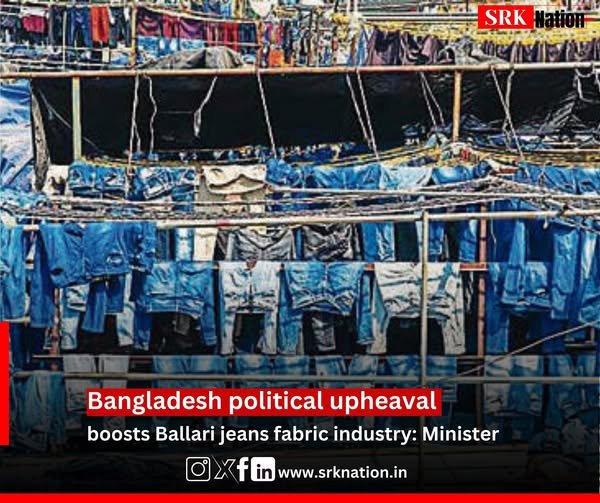The political turmoil in Bangladesh has unexpectedly benefited the jeans fabric industry in Ballari, which has witnessed a 30% surge in production over the past three months, people aware of the development said on Sunday.
Mallikarjun, the owner of Polax Jeans in Ballari, said that wholesale dealers from Bengaluru and Andhra Pradesh are placing bulk orders for jeans fabric, which has pushed both production and sales. “The quality of our fabric is on par with that of Bangladesh. Ballari is the only district in Karnataka manufacturing world-class clothing,” Mallikarjun said.
Bangladesh, known as the world’s second-largest exporter of jeans fabric, had an established reputation for its superior quality. However, Bangladesh witnessed a massive political turmoil and violent protest led by student organisations in August last year. Former prime minister Sheikh Hasina had to step down on August 5 last year and fled to India following the collapse of the Awami League-administration. An interim government headed by Nobel laureate Muhammad Yunus took over.
The ongoing political uncertainty in the country has disrupted its manufacturing and export capabilities, causing delays and escalating costs. “Bangladesh’s fabric was in high demand globally, but the instability has paralysed the sector, negatively impacting its economy,” Mallikarjun said.
The disruptions in Bangladesh’s jeans industry have led to order cancellations and delayed deliveries, pushing Indian wholesale buyers to turn to Ballari. “Even with increased demand, we haven’t raised our prices. Although it’s common to hike rates during such periods, we decided not to take undue advantage,” Mallikarjun added.
Bangladesh’s competitive pricing had previously made it a preferred source for Bengaluru’s wholesalers. However, the rising costs, coupled with transportation issues and other challenges, have shifted their focus to Ballari.
Venugopal, who runs a textile unit in Ballari, highlighted another factor influencing this shift. “Many Indians were involved in the fabric industry in Bangladesh, but recent attacks on religious minorities there have caused Indian distributors to reconsider their business ties,” he said.
Venugopal also emphasised Ballari’s growing reputation in the global market: “Numerous international brands purchase raw fabric from Ballari and tailor it to their fashion lines.”
Ballari’s manufacturing units, particularly in the Mundragi industrial layout on the outskirts of the town, have risen to meet the increasing demand. Over 500 units operate in this area, producing an average of 200,000 jeans fabric units daily, said Venugopal.
The district’s international-standard production has attracted over 90% of Bengaluru’s wholesale fabric sellers and 70% of buyers from other parts of Karnataka and neighbouring Andhra Pradesh.
Ballari deputy commissioner Prashantkumar Mishra highlighted the optimistic scenario, noting that the industry is thriving with heavy orders and round-the-clock operations. “Many unemployed individuals have secured jobs, particularly in the goods packing section, due to the influx of orders,” Mishra said.
He assured that the district administration is supporting the industry by ensuring a steady supply of water and uninterrupted power to the industrial area.
Ballari district in-charge minister Zameer Ahmed Khan credited the economic uncertainty in Bangladesh as a contributing factor to the local industry’s growth.
Speaking to reporters, he said, “The challenges in Bangladesh have turned into a blessing for Ballari, boosting economic activity and creating hundreds of jobs.”
Minister Khan also commended the jeans manufacturers for their approach to balancing costs and wages. “The industrialists have not raised the price of fabric but should have increased daily wages for the low-ranking labourers,” he said.

See insights and ads
पोस्ट को प्रमोट करें · Promote post
Like
Comment
Send
Share






